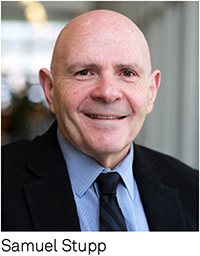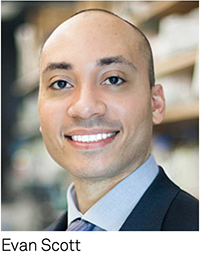SQI scientists developing innovative strategies to fight COVID-19
The coronavirus has claimed the lives of more than 125,000 people worldwide and the death toll continues to climb. In response to this global health crisis, several scientists from the Simpson Querrey Institute (SQI) quickly pivoted their focus to COVID-19 research to combat the pandemic.
Read a sampling of COVID-19-related projects involving SQI scientists, below.
Peptide therapies to treat COVID-19
Researchers in Samuel Stupp’s group and the SQI Peptide Synthesis Core Facility have teamed up with the laboratory of Bradley Pentelute at the Massachusetts Institute of Technology (MIT) to molecularly engineer a novel therapy to treat COVID-19.
The MIT team recently discovered a peptide molecule that binds specifically and strongly to the so-called “spike protein” on the surface of the virus that causes COVID-19. The binding of this molecule to the spike protein could potentially disable the virus and prevent its infection of human cells.
However, peptide drugs — which could revolutionize treatments for many diseases — are notoriously challenging because they are rapidly degraded by enzymes in our bodies, thus losing their efficacy. This is precisely where SQI investigators can help.
Stupp’s laboratory and the Peptide Synthesis Core, directed by Mark Karver, have been working over the past two years on a platform to deliver peptide drugs. Stupp, an expert on self-assembly of peptides, initiated this project with chemistry graduate student Ruomeng Qiu, which involves “gluing” millions of peptides into a nanostructure that becomes the carrier of the precious drugs. The similar chemistry of the drug and the carrier allows the scientists to design nanostructures that protect the peptide drug while it circulates in the body before it encounters the culprit of the disease — in this case, the novel coronavirus.
The SQI team has been investigating the concept using a potential Alzheimer’s disease drug and the general approach has been found to be highly effective using in vitro experiments. Now Stupp, Karver, Qiu and SQI assistant core scientist Dr. Suvendu Biswas have quickly turned their attention to COVID-19 by working with the MIT team and possibly their collaborators at the Icahn School of Medicine at Mount Sinai in New York, who could test the constructs in human cells and animal models.
“It has been great to see how graduate students and postdocs are volunteering to contribute physically or virtually to the rapid progress of the project,” Stupp said in a Northwestern Now press release. “We are very excited about this joint effort with the MIT team given the importance of peptides and peptide nanostructures in the development of new therapies and vaccines.”
Cell-free biotechnology could accelerate COVID-19 therapeutics
A startup company co-founded by SQI faculty member Michael Jewett is using a cell-free biomanufacturing approach to speed the production of antiviral medications that could potentially treat the coronavirus.
The company, SwiftScale Biologics, is working to rapidly produce and test a promising antibody therapy developed by an outside biotherapeutics company. Jewett said the synthetic biology-based platform could cut the production time of new drugs down to a few months rather than closer to a year.
“Since the COVID-19 outbreak, we have dedicated nearly all of our resources to producing an antiviral therapy to fight it,” Jewett said in a Northwestern Now press release. “Specifically, we are designing simplified antibody-based drugs that can be produced in bacteria rather than mammalian cells, which are far slower and more expensive to scale. In this way, we believe that we will be able to get a COVID-19 treatment into the clinic and ultimately to affected patients worldwide more quickly while increasing access.”
In one example of the power of this cell-free platform, Jewett and colleagues from ShanghaiTech University rapidly scaled up production of a molecule called valinomycin that effectively wiped out SARS-CoV in cellular cultures. The researchers hope the drug might also prove effective against SARS’s close genetic cousin, the novel coronavirus.
The cell-free approach enabled Jewett and his co-investigators to increase production yields by more than 5,000 times in just a few rapid design cycles, according to a press release.
Plasmid delivery system for antiviral therapies
Evan Scott’s laboratory is developing a novel plasmid delivery system which in the future could be used to treat a broad range of coronaviruses. Intracellular delivery of plasmids facilitates the expression of short hairpin RNA (shRNA), which can provide long-lasting inhibition of specific viral proteins.
Cell-free biosensing for COVID-19 detection
Jewett and Julius Lucks, associate professor of Chemical and Biological Engineering at Northwestern, are exploring the possibility of repurposing their freeze-dried, cell-free biosensing platform to create a diagnostic for COVID-19. The technology was originally developed to detect contaminants in water as well as human performance markers, and could be widely deployed due to its low cost, transportability and ease of use.
Strategies for safe reuse of personal protective equipment
Mark Hersam’s group is working with Northwestern Memorial Hospital on evaluating decontamination protocols for medical worker personal protective equipment (PPE) to enable its reuse in cases where PPE supply is not keeping up with increased demand caused by COVID-19.

